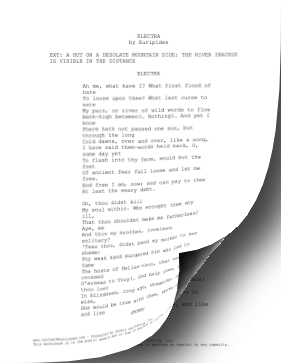

Electra, a young woman, mourns her fate in this 3-4 minute monologue from Euripides' classic play, Electra.
ELECTRA
by Euripides
EXT: A HUT ON A DESOLATE MOUNTAIN SIDE; THE RIVER INACHUS IS VISIBLE IN THE DISTANCE.
ELECTRA
Ah me, what have I? What first flood of hate
To loose upon thee? What last curse to sate
My pain, or river of wild words to flow
Bank-high between?… Nothing?… And yet I know
There hath not passed one sun, but through the long
Cold dawns, over and over, like a song,
I have said them-words held back, O, some day yet
To flash into thy face, would but the fret
Of ancient fear fall loose and let me free.
And free I am, now; and can pay to thee
At last the weary debt.
Oh, thou didst kill
My soul within. Who wrought thee any ill,
That thou shouldst make me fatherless? Aye, me
And this my brother, loveless, solitary?
'Twas thou, didst bend my mother to her shame:
Thy weak hand murdered him who led to fame
The hosts of Hellas-thou, that never crossed
O'erseas to Troy!… God help thee, wast thou lost
In blindness, long ago, dreaming, some-wise,
She would be true with thee, whose sin and lies
Thyself had tasted in my father's place?
And then, that thou wert happy, when thy days
Were all one pain? Thou knewest ceaselessly
Her kiss a thing unclean, and she knew thee
A lord so little true, so dearly won!
So lost ye both, being in falseness one,
What fortune else had granted; she thy curse,
Who marred thee as she loved thee, and thou hers…
And on thy ways thou heardst men whispering,
"Lo, the Queen's husband yonder"-not "the King."
And then the lie of lies that dimmed thy brow,
Vaunting that by thy gold, thy chattels, Thou
Wert Something; which themselves are nothingness.
Shadows, to clasp a moment ere they cease.
The thing thou art, and not the things thou hast,
Abideth, yea, and bindeth to the last
Thy burden on thee: while all else, ill-won
And sin-companioned, like a flower o'erblown,
Flies on the wind away.
Or didst them find
In women… Women?… Nay, peace, peace! The blind
Could read thee. Cruel wast thou in thine hour,
Lord of a great king's house, and like a tower
Firm in thy beauty.
(Starting back with a look of loathing.)
Ah, that girl-like face!
God grant, not that, not that, but some plain grace
Of manhood to the man who brings me love:
A father of straight children, that shall move
Swift on the wings of War.
So, get thee gone!
Naught knowing how the great years, rolling on,
Have laid thee bare, and thy long debt full paid.
O vaunt not, if one step be proudly made
In evil, that all Justice is o'ercast:
Vaunt not, ye men of sin, ere at the last
The thin-drawn marge before you glimmereth
Close, and the goal that wheels 'twixt life and death.